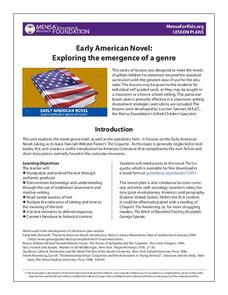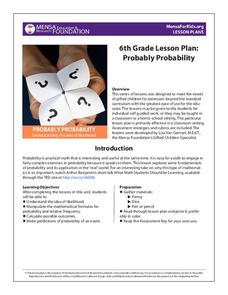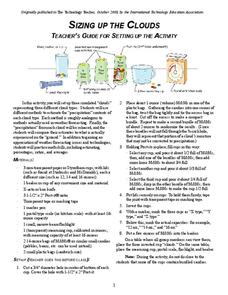American Chemical Society
The Discovery of Fullerenes
Carbon is the most common element on earth, so the innovative discovery of a new type of carbon molecule won the 1996 Nobel Prize. In the ready-to-go instructional activity, scholars learn about C60 and how it has opened up the entire...
American Chemical Society
Isolation of Phytochrome
Why do soybean plants that are planted weeks apart in the spring mature simultaneously in the fall? Four independent activities cover the history of phytochrome research, scientist collaboration, the electromagnetic spectrum, and...
McGraw Hill
Writing Prompts, Student Rubrics, and Sample Responses
Whether you are teaching mainstream, advanced, or intervention language arts classes, you will find something helpful in a thorough writing packet. It includes prompts, rubrics, responses, helpful hints, graphic organizers, and many...
E Reading Worksheets
Fact and Opinion - Worksheet: 1
Pupils identify fact and opinion statements with a language arts worksheet. Then, they explain their thinking in a sentence, including the clues or set of words that helped them arrive at their answer.
Exeter Township School District
Order of Operations
Young mathematicians analyze computation errors by three hypothetical learners. It begins with a scenario that presents an equation that includes addition, multiplication, division, and subtraction. According to the order of operations,...
ESL Library
Muhammad Ali
"Float like a butterfly, and sting like a bee" with a resource about the greatest boxer of our generation. A short biographical reading passage introduces young readers to Muhammad Ali, and includes information about his early life as...
MENSA Education & Research Foundation
Hurricanes
Learn the ins and outs of hurricanes through a series of lessons answering, "What is a hurricane? How does it travel? How is one formed, measured, and named?" Information is presented through informative text and images, while...
MENSA Education & Research Foundation
Early American Novel: Exploring the Emergence of a Genre
Need an extra challenge for your best readers? Check out a unit that uses Hannah Webster Foster’s epistolary novel, The Coquette, published in 1797, as the anchor text. The resource is packed with project ideas; each with its own...
MENSA Education & Research Foundation
Probably Probability
Reinforce the concept of probability with a series of lessons highlighting the idea of likelihood, probability formulas, relative frequency, outcomes, and event predictions. The collection is made up of four lessons offering informative...
Curated OER
Fracking: Positive or Negative Impact?
Your teenagers may have heard of fracking, but do they really know what it is? And could they debate the benefits and risks? Educate your environmental science class with a activity about hydraulic fracturing, non-renewable energy...
EduGAINs
Making Savvy Consumer Choices
It's never too early to learn about grocery budgeting. Middle schoolers delve into the world of consumer math with a lesson that focuses on both healthy choices and real-world math applications. Groups work together to form a grocery...
Chymist
The Solubility of a Salt in Water at Various Temperatures
An educational lesson allows young chemists to test the solubility of different types of salt at various temperatures. Groups create a graph using data from unsaturated, saturated, and supersaturated solutions.
WindWise Education
Where Do You Put a Wind Farm?
This is not your ordinary farm! Using a case study, small groups study two proposed locations for a wind farm. After researching all the information about the sites, the groups choose a site. Each team member writes up the proposal...
WindWise Education
How Do You Feel About Wind Energy?
Tell me what you really think. The class reviews articles related to wind energy to see how the author uses words, phrases, and images to sway the reader. Through a class discussion, individuals share their feelings from the media...
International Technology Education Association
Pixel This!
Did the image I drew match the image you saw? By simulating a satellite and a ground station, teams of two transmit data in the form of pixels in order to recreate an image. They use four different levels of brightness, creating slightly...
International Technology Education Association
Sizing Up the Clouds
How much rain can that cloud make? Through a simulation, the class estimates the amount of candy rain contained in different cup clouds. After probing the clouds using different methods, class members adjust their estimates. Participants...
International Technology Education Association
Tidy Up Those Sloppy Force Fields!
It is just magnetic. This resource presents the concept of Earth's and another planet's magnetic field and how spacecrafts detect them. Learners study a problem using magnetometers and participate in three experiments to come up with a...
WindWise Education
When is a Wind Farm a Good Investment?
When will a wind farm pay for itself? Individuals calculate the anticipated annual revenue for two proposed wind farms. By comparing the number of years it takes to pay back the initial investment, they determine which site makes the...
WindWise Education
Can We Reduce Risk to Bats?
It is just batty! A resource outlines a case study scenario of reducing the risk to bats. Teams learn about the bat populations in the area of the wind farm, then research and propose a solution.
WindWise Education
What is Wind Power's Risk to Birds?
How is risk determined? Through the use of a reading passage, individuals or groups learn about bird interactions with man made structures along with wind turbines. Pupils use information from the second reading passage to conduct an...
WindWise Education
How Does Energy Affect Wildlife?
Is wildlife affected the same way by different electricity generation methods? Teams work together to research four electricity generation sources and their impacts on wildlife. The teams create a summary report and share their findings.
WindWise Education
How Can I Design Better Blades?
Small groups use information they have learned about blade construction to design, build, and test their own concepts. The teams compete in order to determine which design has the best average power output.
WindWise Education
How Does a Generator Work?
I get a charge out of this. In order to learn how a generator works, groups build and test one in this ninth lesson of the series. The generators are tested at low speed and high speed to determine the watt output and whether they have...
Curated OER
Tears of Joy Theatre Presents Anansi the Spider
Accompany the African folktale, Anansi the Spider, with a collection of five lessons, each equipped with supplemental activities. Lessons offer multidisciplinary reinforcement in English language arts, social studies, science, and arts...

























